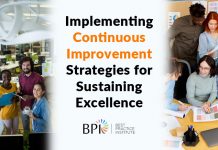Paul Plotczyk ,WSA
Too often we consider coaching only in terms of its effectiveness in addressing performance issues or resolving performance problems. In fact, at its best, coaching helps us to accomplish three critical objectives at once:
Enhancing Performance. Through a variety of means, including performance feedback, modeling, and instruction, coaching helps increase an individuals’ ability to take effective action.
- Building Relationships. Coaching reinforces and enhances our sense of partnership and solidifies our working commitment to one another. As a result of effective coaching interactions, we gain a greater willingness to work productively together in the future.
- Promoting Learning and Development. The best coaching includes a reflective loop that heightens learning, generates new insights and can lead to breakthrough thinking. Effective coaches pay attention not only to the immediate need to assist performance, but also to the need to develop capability for future effectiveness.
The coach’s work might be viewed as analogous to that of juggler’s, a complex skill that requires keeping one’s eye on all three balls simultaneously!

Ready-to-Wear Feedback: See Something, Say Something
Having an easy to implement and useful model for giving good feedback can make any manager the star juggler! You may have heard the old saying, “Feedback delayed is feedback denied.” And feedback is a key ingredient of good coaching. Well, See Something, Say Something is the newer, updated, easy to remember, post 911 equivalent saying.
An executive who was working for one our clients at the time, the New York’s Metropolitan Transportation Authority (MTA), came up with the slogan shortly after 9/11, “If You See Something, Say Something™” that they used in their subways and other transportation areas, to remind people to be on alert. This refrain was picked up by another one of our former clients, the Department of Homeland Security (DHS) for use in their public awareness campaign to for anti-terrorism and anti-crime efforts.
Not being people to let a good saying go to waste and to keep the momentum going for a tried-and-true catchphrase we have found it to be a useful, short-hand mantra of sorts that can serve to remind people to give more feedback – especially positive – more frequently.
Whether the feedback is positive or negative, if the information can be provided close to the event as possible, the value of the feedback is substantially increased.
2 Critical Coaching Tips
Also, it is well known by managers that not only is effective feedback well timed feedback, and hopefully, requested. So, two cautions:
- There’s a difference between timely feedback and rushed feedback. If you’re providing feedback around an emotionally charged event, it may make sense to wait a day or two. This will let your emotions settle. Schedule an appointment time and have a one-on-one meeting in private. Don’t give important and/or sensitive feedback in the hallway.
- Feedback that is requested is more powerful. Ask permission to provide feedback. “I’d like to give you some feedback about the presentation that you made today. Please let me know when you are available for a discussion.”
A single principle lies at the heart of all these suggestions: As managers, we can truly make a difference daily.
Coaching in the “culture of urgency” that is the contemporary workplace does not mean that we should abandon our attention to people’s development needs. When we as managers learn to identify and use the considerable leverage afforded by “coachable moments,” we can boost performance and accelerate learning and development. These targeted doses of coaching can have as much or more effect than lengthy, formal coaching sessions.
So when you see something, say something – and don’t drop the ball!










